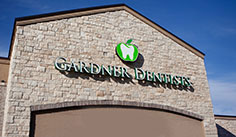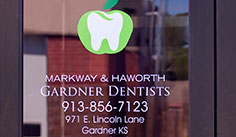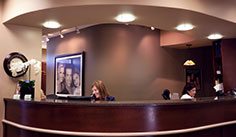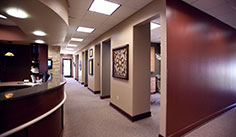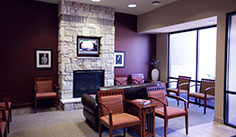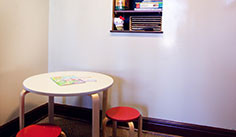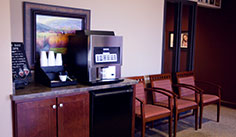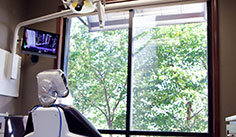Aftercare Instructions
Our goal is for you to leave every appointment with all the information you need to take care of yourself. However, this section of our website is available in case you need a quick refresher. Even with this information available, please do not hesitate to reach out to us directly – through email or over the phone – with a specific question or concern.
Fillings
The tooth-colored material we use to fill cavities will last for years, but you may want to be aware of the following when you have a new filling.
- Avoid chewing hard foods, such as ice and hard candy, on teeth with fillings because the composite material can break under extreme force.
- If you child has a filling done, keep an eye on him/her until the anesthetic wears off. Sometimes children will chew on the inside of their lips, cheeks or tongue.
- Your new filling may be sensitive to hot and cold for a few weeks, particularly if it is a deep cavity. If your bite feels different, please call us for an appointment for a simple adjustment.
- Your gums may be sore for a few days at the injection site and/or around the tooth that was repaired.
- A tooth with a new filling may at first feel different to your tongue, but usually you will become accustomed to the difference in a few days.
Temporaries
- If a temporary crown breaks or comes off, put it back on the tooth with denture adhesive from the drugstore and call us for an appointment. It is important to put the temporary onto the tooth so that your permanent crown fits correctly. Do not floss a tooth with a temporary crown.
- A temporary is just that—temporary—and is not the same size, shape and color of the final crown.
- Your temporary may be sensitive to hot, cold, pressure or sweets. If you feel your bite is not balanced, please let us know so that we may schedule you for a simple adjustment.
Permanent Crowns
- It may take a few days to get used to the new crown or bridge. Your tooth may be sensitive to hot and cold for a few weeks. If your bite doesn’t feel balanced, please call us for an appointment.
- Avoid chewing hard or sticky foods on the new crown for about 24 hours.
- Daily brushing and flossing and regular cleanings help keep the tooth under a crown healthy. Regular checkups are important for properly caring for your crown as they will allow us to detect decay at its earliest stage.
- It may take a few days to adjust to the feeling of the new crown or bridge and your tooth may be sensitive to hot and cold for a short period of time. If you notice your bite doesn't feel balanced, please call us for an appointment.
Dentures and Partials
- If you have a few sore spots in your mouth after wearing your denture or partial, please let us know. We can relieve this pressure during your next appointment.
- It may take a few weeks until your new bite feels completely comfortable. We can adjust your bite after your dentures or partial have settled into place.
- Clean your dentures or partial with a denture brush and toothpaste, and soak them in a denture cleanser periodically. We also recommend soaking partials in water at night. You may want to brush your gums daily to clean them. If you have a partial, take extra care to clean both the partial and your natural teeth daily to reduce the chance of decay.
Root Canals
If you have had a root canal, your tooth may be sensitive to hot, cold or pressure. Please call our office for an appointment if you experience swelling after a root canal.
- If the tooth with the root canal feels higher than others when you bite your teeth together, please call us for an appointment for a simple adjustment. A “high” bite can make the tooth sensitive for a longer period of time.
- If you have a temporary filling, please eat carefully until the final restoration is placed.
- The gums around the tooth and the injection site may be sore for a few days.
- After a tooth has a root canal, it becomes brittle and can break easily. If it breaks it has to be removed. To prevent this problem, your dentist will recommend a full coverage crown over the tooth to protect it.
Veneers
You will have temporaries for a short time while your permanent veneers are being made. Temporaries are attached only slightly to the underlying teeth and can be removed easily.
- If a temporary comes off, call us for an appointment to replace it immediately. If you can’t come in immediately, put the temporary in place with a denture adhesive from the drugstore and see us as soon as possible.
- Temporaries are not the same size, shape and color of the permanent veneers.
- Your teeth may be sensitive to hot, cold, sweets and pressure. You also may notice some stains under temporaries. These stain will be removed before your permanent veneers are placed.
- Brush your temporary veneers gently and do not floss them as they may come off.
- As with regular teeth, avoid chewing very hard food, such as hard candy and ice, because a veneer can break under extreme force.
- Brushing, flossing and regular cleanings are essential for the stability and appearance of your veneers. Regular checkups mean that any potential problems can be found early and repaired easily.
- Your gums may recede from the veneers and show discolored teeth underneath. Usually this occurs after many years and requires veneer replacement.


